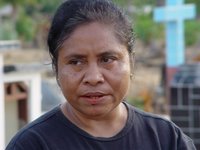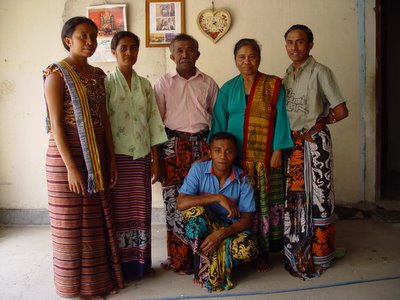When we were filming in Timor, Oecusse was synonymous with rest. A break from tent-life, and one-mineral-water-bottle showers, and canned tuna and sardines. Fensi’s mum would pull out all the stops whenever we returned from a shoot – dirty, exhausted and very smelly. Senora Jacinta liked fattening us up and was constantly plying us with food – fresh vegetables, potato and bean stews, chicken with peas, grilled fish and… her very own air manas – a delicious but fiery Timorese chilli.
 We stayed, knowing we were a strain on the family’s resources. Fensi’s father is a respected community leader, his mother runs a small restaurant, and by Timor standards, they’re nowhere near poor. Still, it must have been a challenge feeding three hungry foreigners. Yet, they wouldn’t hear of it when we offered to move into the guest house down the road. They even insisted we sleep in their best room with a proper bed – the very same room President Xanana Gusmao stayed in when he was campaigning for votes! After our first visit, we sneakily tried to leave behind an envelope with some money… only to be found out. It took a lot of persuading before Senora Jacinta would accept our token.
We stayed, knowing we were a strain on the family’s resources. Fensi’s father is a respected community leader, his mother runs a small restaurant, and by Timor standards, they’re nowhere near poor. Still, it must have been a challenge feeding three hungry foreigners. Yet, they wouldn’t hear of it when we offered to move into the guest house down the road. They even insisted we sleep in their best room with a proper bed – the very same room President Xanana Gusmao stayed in when he was campaigning for votes! After our first visit, we sneakily tried to leave behind an envelope with some money… only to be found out. It took a lot of persuading before Senora Jacinta would accept our token.
The Otes’ generosity is remarkable. Astounding, even, given what they’ve witnessed.
We met Fensi at a memorial service for his younger brother – on sacred land, near the volcano on the road to Passabe. We were a couple of nosey foreigners, with no real sense of what was going on. And then Senora Jacinta showed us pictures. Of her dead boy with welts all over his body. Bruises on his head. His skin red and raw from repeated punches. Fante Ote died in Dili. He was barely 20. The perpetrators are still at large. The family believes former pro-Indonesia militias were exacting revenge on Mr Ote, a prominent pro-independence supporter and a member of the Truth Commission.
The images hit us hard. We thought Timor to be war-ravaged but peaceful. But this was the country the Otes knew – still beautiful, but tense. Violence, always a possibility, beneath the veneer of calm.

Yet in this remote enclave where foreigners are rare, the Otes took us in. Never suspected us of wanting anything more than to tell their community’s story. They took care of us, and took pains to make sure we were accepted in the villagers where we were filming. PASSABE would never have been possible without them.

